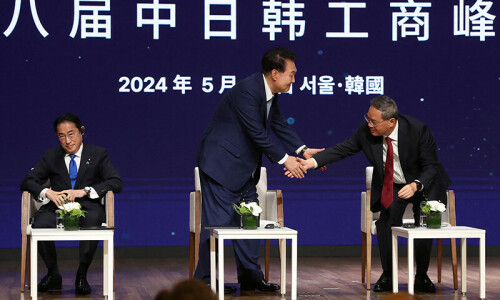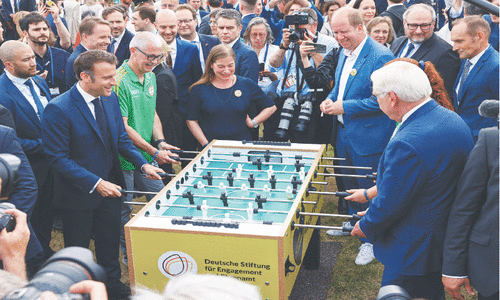TOKYO, June 3: Nepal’s Maoist chief has ruled out renouncing armed struggle but said a return to violence was unlikely after the former rebels achieved their goal of ending the world’s last Hindu monarchy.
The Maoists, who waged a decade-long insurgency that left more than 13,000 people dead, won a convincing election victory for a special assembly that last week voted to dethrone King Gyanendra.
In an interview published on Tuesday, Prachanda, whose nom de guerre means “The Fierce One,” said that the election showed that the Nepalese people wanted “peace and change.” “I don’t think there will be any kind of necessity to use arms again,” he told Japan’s Yomiuri Shimbun.
But he refused to renounce the right of armed struggle by the Maoists, who have 31,000 fighters in UN-monitored camps across the land of Mount Everest.
“It doesn’t mean nobody should take arms to resist oppression of the government or something like that. I can’t predict that,” he said.
The Maoists have called for their guerrillas to be brought into Nepal’s army, formerly a bastion of royalist support.
But Nepal’s army, while pledging to respect the decision to abolish the monarchy, has said it would be impossible for indoctrinated leftist guerrillas to integrate into the 90,000-strong force.
The United States, which supplied arms to Nepal to fight the rebels, continues to classify the Maoists as terrorists, thereby restricting the group’s travel and financial transactions.
Washington has repeatedly called on the Maoists to stop violence and intimidation and rein in their dreaded youth league.
But in a shift, the United States has held talks with Prachanda, a former schoolteacher whose real name is Pushpa Kamal Dahal and who spent more than two decades underground.
Prachanda, whose rebels were long sharply critical of the West and neighbouring India, said he wanted “a diplomatic relationship” with the United States.
“I think the US is going to change its attitude and policy. They are trying to understand the real dynamics of our country,” he said.
“Slowly, gradually, they are taking more pragmatic steps.”
—AFP












































Dear visitor, the comments section is undergoing an overhaul and will return soon.